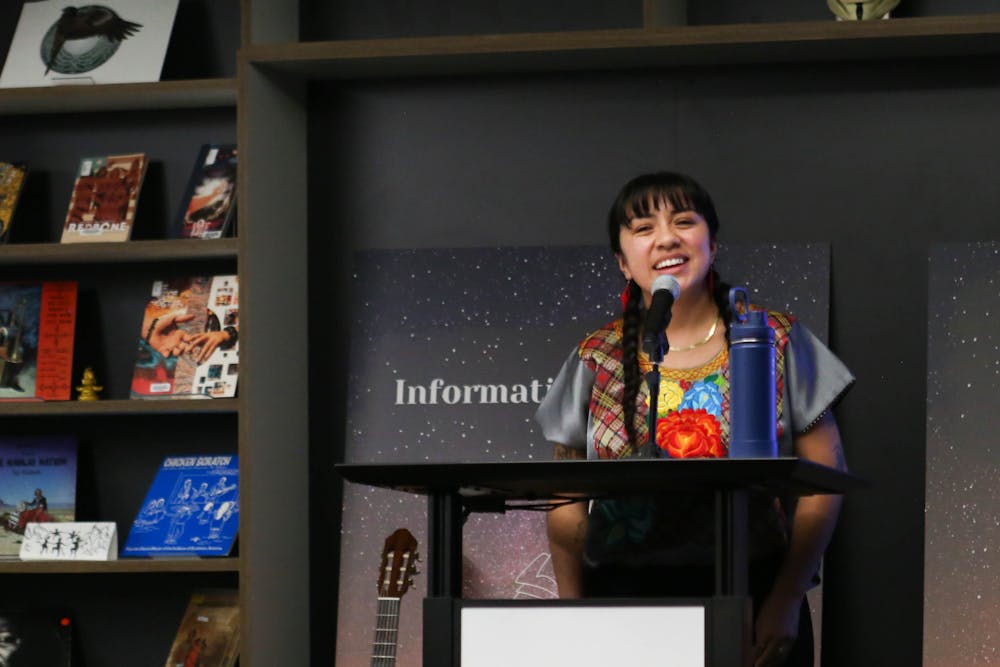The Labriola National American Indian Data Center may seem like a quiet collection of books nestled within Hayden Library, but on Feb. 29 it turned into a vibrant space for spoken word and artistic expression at the Indigenous Open Mic Poetry Night.
"I think it's necessary to give space to Indigenous creators and make room for them on a campus that is situated on ancestral lands and different Indigenous tribes," said Amber Blaeser-Wardzala, a graduate student studying creative writing.
Blaeser-Wardzala, one of the featured writers, read a short story about a girl who is left to grapple with loss after her Native father dies, leaving her with her white mother.
"I write primarily about Indigenous identity and the cross of being mixed and female," Blaeser-Wardzala said. According to her website, she is an Anishinaabe writer, beader, fencer and Jingle Dress Dancer.
The bi-annual Indigenous Open Mic Poetry Night, hosted in collaboration with the Virginia G. Piper Center for Creative Writing, begins with readings by invited Indigenous poets from ASU and around the country, followed by opportunities for members of the community to step up and perform.
"We're really open to all sorts of different genres and we don't really have a theme this year, we're kind of leaving it up to whatever people want to bring to the table," Yitazba Largo-Anderson, the program coordinator of the center, said.
Largo-Anderson said attendants for the open mics usually include students, members of the Phoenix community and families of poets. In the past, there was even a father-daughter performance.
"My favorite part (of performing at open mics) I think is just being able to share in community, and keeping the oral tradition of storytelling and poetry alive," said Ayling Dominguez, a graduate student studying creative writing.
Dominguez is an educator with roots in the Nahua culture from the Mexican state of Puebla and Santiago de los Caballeros, in the Dominican Republic.
"(The poems are) all kind of just talking about reconnecting to a lot of my Indigenous lineage," Dominguez said.
Dominguez performed a set of original poems at the open mic, including one dedicated to missing and murdered Indigenous women.
Yitazba Largo-Anderson, the program coordinator of the center, said the Labriola Center was established in 1993 to hold national and international collections of books about and written by Indigenous authors. In addition, the center hosts events to engage with the local Native community.
READ MORE: Native American veterans practice Indigenous art, connect through shared experiences
The open mic didn't just feature writers, some participants performed music.
Nataani Hanley-Moraga, a senior studying American Indian studies and a student worker at the Labriola Center, is known as the center's "resident beat-maker". He DJs and produces music for events such as the open mic, Lo-Fi study sessions and community music workshops.
At the open mic, Hanley-Moraga, who is a Diné, Húŋkpapȟa and Chicano Indigenous producer, took up the microphone to perform a rap with an original beat he created earlier that day.
"The nice thing about these open mics is, it's not really a judgmental space," Hanley-Moraga said. "So even if I don't get my cadence right or maybe this beat is not mixed to where I want to put it on a CD or something like that, it's all ok. What's important is just being able to share my story."
Edited by Alysa Horton and Shane Brennan
Reach the reporter at spbracci@asu.edu and follow @SophiaBraccio on X.
Like The State Press on Facebook and follow @statepress on X.
Sophia is a senior studying journalism and mass communication. This is her sixth semester with The State Press. She has also worked at Nomads with Notebooks and Blaze Radio and interned for The Arizona Republic.




